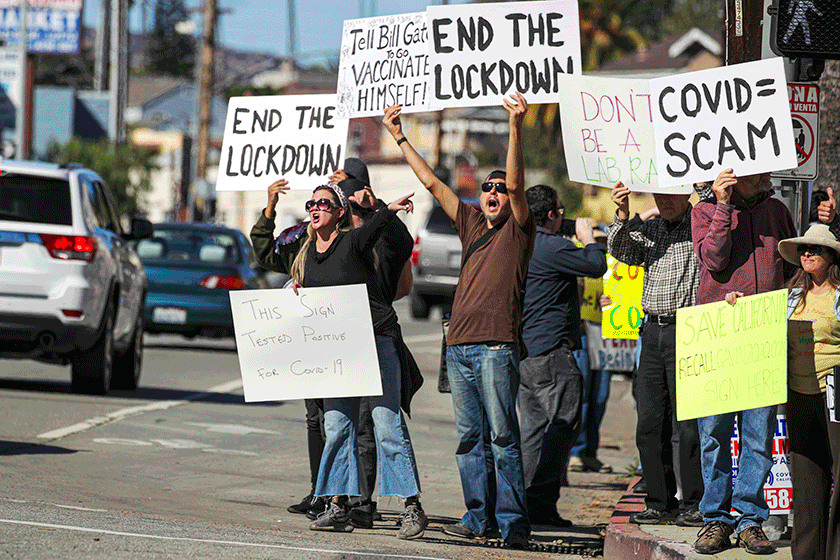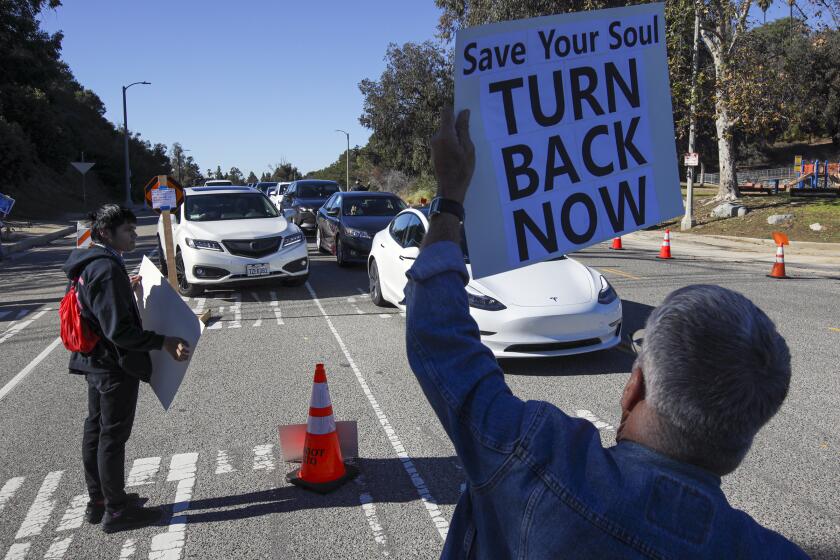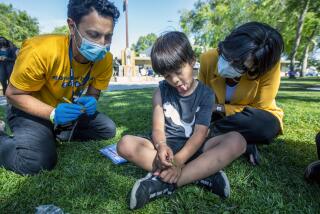Anti-vax ‘mob’ that closed Dodger Stadium vaccination site sparks outrage

After a group of protesters managed to disrupt operations at Dodger Stadium’s mass COVID-19 vaccination site Saturday, some Los Angeles officials expressed fury at the demonstrators while calling for increased security at testing and vaccination installations.
Los Angeles Fire Department officials closed the main entrance to the stadium — one of the largest vaccination sites in the country — for about an hour Saturday after 40 to 60 demonstrators appeared on Stadium Way holding signs that decried masks while shouting unfounded claims about the dangers of the vaccine.
Dodger Stadium’s COVID-19 vaccination site temporarily shut down after protesters gather at entrance
The demonstrators included members of anti-vaccine and far-right groups.
The group dispersed around 3 p.m., and there were no arrests or injuries reported, said LAFD Assistant Chief Ellsworth Fortman, who oversees the department’s COVID-19 response. Fortman said approximately 5,740 doses of the vaccine were issued Saturday at the site, which distributes 5,700 to 7,700 doses daily. Workers were still vaccinating people inside the stadium during the hour that the main entrance was closed, he said.
Both fire and police officials have said that the group was nonviolent and that the decision to close the entrance to the facility was a precaution. The protest left several city leaders infuriated, with some questioning why police weren’t more aggressive toward demonstrators, contending the LAPD has been more proactive in quashing anti-police or Black Lives Matter protests.
“Look, the world sees this. What it does is it undermines our public safety community. It’s not good for our public safety community for people to believe that there’s inequitable treatment,” said L.A. City Councilman Gil Cedillo, whose district includes Dodger Stadium. “That does not help them do their job. When some people get coddled and others don’t.”
The protest came as frustrations over state and county officials’ handling of the virus remain high. The number of coronavirus deaths in California surpassed 40,000 on Friday. More than half those fatalities have occurred since Nov. 1, part of a startling surge in the lethality of the virus, amid concerns that more dangerous strains are emerging.
At the same time, business owners who are struggling to keep their lights on have repeatedly called for the relaxation of rules limiting dining and other gatherings.
Fortman said the decision to close the gate was made after protesters approached the Stadium Way entrance out of concerns for the safety of workers inside and the protesters themselves, who he said could have been struck by cars as they marched through the site.
After 45 minutes, Fortman said, LAPD officers approached the group and warned them they could face citation or arrest if they entered the vaccination site and ordered them to get out of the street.
The group complied and largely dispersed by 3 p.m., Fortman said. The protesters’ actions ultimately did little to inhibit vaccine distribution, he said.
“At the end of the day, it didn’t really impact much,” he said. “I feel bad for those folks [who] ended up waiting an additional 50 minutes.”
It was unclear how many people left the line to enter the site and missed their appointment during the nearly hourlong closure, but long lines have already proved to be a major deterrent for elderly Angelenos seeking the vaccine.
Some expressed concern online Saturday that their grandparents had probably given up trying to get vaccinated Saturday due to the protest.
Despite the fact that the protesters’ actions led fire officials to close the stadium’s entrance, police said there would have been no reason to declare an unlawful assembly or order arrests Saturday.
Officer Mike Lopez, an LAPD spokesman, said the protesters complied with orders to stay out of the street and did not violate any other laws or ordinances while outside Dodger Stadium.
Andrea Garcia, a spokeswoman for Mayor Eric Garcetti, said the city is “reviewing vaccine site safety protocol” after the incident and will establish designated spaces for protesters should demonstrations be staged at vaccination sites in the future.
Although it is not clear who organized the protest, fliers promoting the event were shared online by the group Shop Mask Free Los Angeles, whose members have repeatedly shown up at supermarkets and stores in recent months and attempted to purchase items without masks.
The events usually end in arguments between the group’s members and store employees, and sometimes draw law enforcement responses, according to videos the group has published online.
The LAPD has responded to several incidents involving the group, normally bringing peaceful ends to their demonstrations but rarely issuing citations despite the group’s obvious repeated violations of city and county health ordinances that mandate the wearing of masks.
Los Angeles police did arrest one member of the group during an incident Jan. 20, according to city officials, but Lopez could not immediately provide information about that incident or other contacts between the LAPD and those demonstrators.
Cedillo said he was especially furious that the demonstration took place in his district, which has been hit hard by the virus. In recent weeks, Cedillo’s office has posted multilingual signs in parts of Westlake, Lincoln Heights, Highland Park and Koreatown warning people they were entering a “high-risk area” for COVID-19, and he also said he’s sent staff members to knock on doors to provide information about vaccinations to senior residents.
Cedillo’s district includes several neighborhoods that are predominantly working-class and Latino, two groups that have been disproportionately affected by the virus. The number of Latinos in L.A. County who are dying from the virus on a daily basis has surged in recent weeks.
“This mob feels they have a right to try to stop people like seniors, janitors, housekeepers, restaurant workers and supermarket workers from getting the vaccine that they covet. That they want,” Cedillo said. “It’s just very offensive. Very arrogant. It’s an incredible sense of entitlement.”
More to Read
Sign up for Essential California
The most important California stories and recommendations in your inbox every morning.
You may occasionally receive promotional content from the Los Angeles Times.












